
In the year since Hamas attacked Israel on Oct. 7, 2023, and Israel responded by invading Gaza, there have been modest shifts in U.S. public opinion on the war. This data comes from a Pew Research Center survey conducted in September, as well as previous Center surveys on the conflict.
- Slightly more Americans now think Israel’s military operation against Hamas is going too far than thought so in December 2023.
- More Americans now want the United States to play a role in diplomatically resolving the war than did so in February.
Pew Research Center conducted this survey as part of our broader research about U.S. public views on the Israel-Hamas war. We interviewed 9,680 U.S. adults from Sept. 16 to 22, 2024.
Everyone who took part is a member of the Center’s American Trends Panel (ATP), a group of people recruited through national, random sampling of residential addresses who have agreed to take surveys regularly. This kind of recruitment gives nearly all U.S. adults a chance of selection. Surveys were conducted either online or by telephone with a live interviewer. The survey is weighted to be representative of the U.S. adult population by gender, race, ethnicity, partisan affiliation, education and other factors. Read more about the ATP’s methodology.
In this survey, Jews and Muslims are defined as U.S. adults who answer a question about their current religion by saying they are Jewish or Muslim, respectively. Unlike our 2020 report on Jewish Americans, this report does not separately analyze the views of “Jews of no religion” (i.e., people who identify as Jewish culturally, ethnically or by family background but not by religion).
Although only some religious subgroups are analyzed in this report, the survey included respondents of many other religious backgrounds, including members of the Church of Jesus Christ of Latter-day Saints (widely known as Mormons), Hindus and Buddhists. But there are not enough respondents from these smaller groups to report on their answers separately.
Here are the questions used for this analysis, along with the topline and the survey methodology.
However, public opinion is largely unchanged on other questions about the conflict:
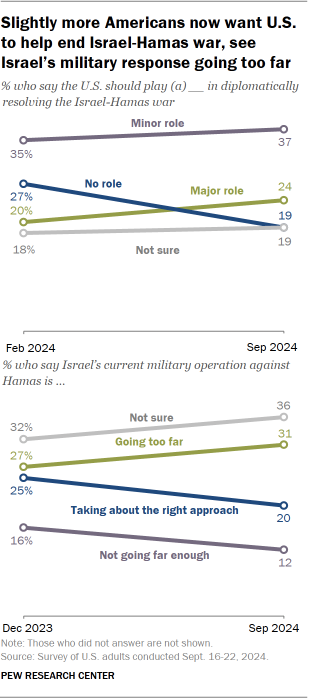
- Most Americans continue to think lasting peace between Israelis and Palestinians is unlikely.
- Confidence in Israeli Prime Minister Benjamin Netanyahu to do the right thing regarding world affairs remains low.
Americans are also concerned about the war expanding to other countries in the region and U.S. military forces becoming more directly involved in the fighting. (Both as the survey was fielding and since, Israel and Hezbollah have been actively targeting one another across the Israel-Lebanon border. But the survey was completed before Israel assassinated Hezbollah’s leader, Hassan Nasrallah, and prior to Israel launching a ground operation in Lebanon and Iran launching ballistic missiles at Israel.)
There are notable partisan differences on several of these questions, including on views about Israel’s military operation against Hamas. Half of Democrats and independents who lean toward the Democratic Party think Israel has gone too far, while only 13% of Republicans and GOP leaners agree.
In the sections below, we explore differences on each question by political party and age. We also look at religious differences, including in the views of Jewish and Muslim Americans.
Views on diplomatic negotiations
A majority of Americans (61%) say the U.S. should play a role in diplomatically resolving the Israel-Hamas war. Still, more want the U.S. to play a minor role (37%) than a major one (24%). An additional 19% would prefer for the U.S. to play no diplomatic role at all, and 19% are unsure.
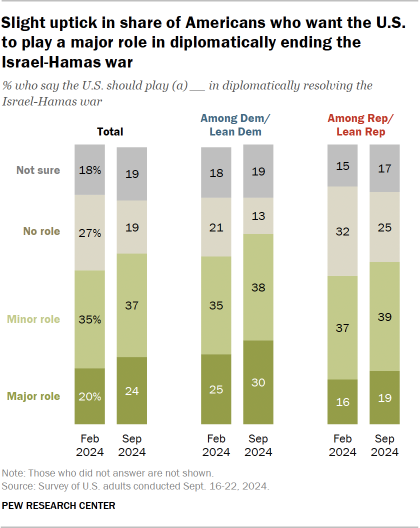
On balance, more Americans now want the U.S. to play some (either major or minor) role in resolving the war than in February (55%), when we last asked this question.
Views by party
Republicans remain more likely than Democrats to say the U.S. should not play any role in resolving the conflict (25% vs. 13%), but shifts have taken place within both parties. The share of people who take that position has declined in both camps, falling by 7 percentage points on the Republican side and 8 points among Democrats.
On the other hand, 30% of Democrats now want the U.S. to play a major role, up from 25% in February. The share of Republicans who say this is up 3 points (from 16% to 19%).
Views by age
Views have also changed among the youngest adults. Today, 22% of adults under 30 want the U.S. to play a major diplomatic role in resolving the war, while 34% want it to play a minor role and 23% say it should play no role. The share saying the U.S. should have a major role has increased by 9 points since February, while the share saying it should have no role decreased by 6 points.
Looking at this age group by party, the share of Republicans under 30 who want America to play a major role in diplomatically resolving the war has increased 7 points (from 9% to 16%). Among Democrats under 30, it has risen 11 points (from 17% to 28%).
Views by religion
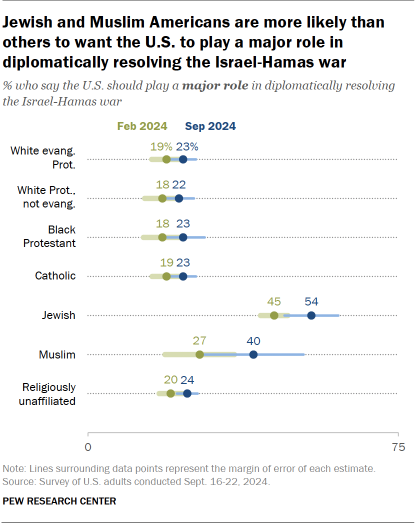
There are also differences by religion in views of the United States’ role in the conflict. Jews were the most likely in February to want the U.S. to be heavily involved in ending the conflict, and the same is true now.
Today, 54% of Jews think the U.S. should play a major role in diplomatically resolving the war, up from 45% in February.
Among Muslims, 40% now say the U.S. should play a major role, compared with 27% in February. At that time, they were the second-most likely religious group analyzed to want major U.S. involvement.
Opinion about Israel’s current military operation against Hamas
About three-in-ten Americans (31%) say Israel’s current military operation against Hamas is going too far, while 12% say it is not going far enough and 20% say it’s taking the right approach. But a plurality of Americans (36%) say they are unsure about Israel’s handling of the conflict.
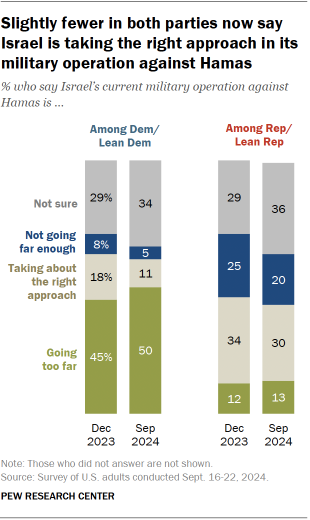
Americans’ opinions have shifted slightly since we last asked this question in December. Americans are now more likely to say Israel’s military operation has gone too far or they are unsure. They are also less likely to say Israel has not gone far enough or is taking about the right approach.
Opinions have shifted among several subgroups. For example, the share of Americans ages 65 and older who say that Israel’s military operation has gone too far is higher now (27%) than in December (16%). However, those ages 65 and older continue to be less inclined than those under 30 (41%) to take that position.
Partisan views have shifted as well:
- Democrats are more likely now than they were last year to say Israel is going too far in its military response (50% vs. 45%).
- Republicans are less likely now than in 2023 to say Israel’s military response has not gone far enough (20% now, down from 25%).
- Republicans are also more likely to express uncertainty than they were in 2023 (36% vs. 29%).
Looking at changes by religious group, White nonevangelical Protestants are more likely than they were in 2023 to say Israel has gone too far (28% vs. 15%). Meanwhile, White evangelical Protestants are less likely to say Israel’s military response is not going far enough (20% vs. 28%) and more likely to say they are unsure (35% vs. 23%).
The 2023 survey did not include enough Muslim or Jewish respondents to show their responses separately. But in the 2024 survey, 71% of U.S. Muslims say Israel’s military operation is going too far, while 9% think Israel is taking the right approach and 3% say it has not gone far enough. The remaining 17% are unsure.
Jewish Americans, on the other hand, are quite divided on this question:
- 28% say Israel’s military operation is going too far.
- 24% say it has not gone far enough.
- 32% say it is taking the right approach.
- 13% are unsure.
Confidence in Netanyahu
More Americans say they have little or no confidence in Netanyahu (52%) than say they have a lot or some confidence in him (31%) to do the right thing regarding world affairs. Another 17% have not heard of Netanyahu or did not answer the question.
There are large partisan differences in views of the Israeli leader: Half of Republicans express confidence in Netanyahu, compared with only 14% of Democrats. The 71% of Democrats who have little or no confidence in Netanyahu includes 39% who say they have no confidence in him at all.
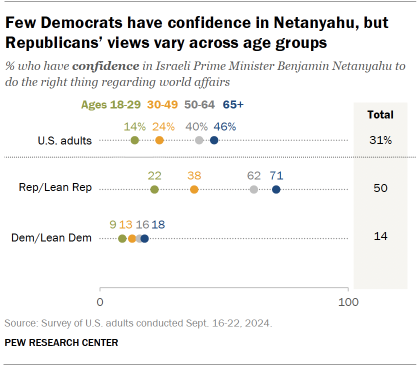
Among Republicans, there are substantial age differences: 22% of Republicans under 30 express confidence in Netanyahu, compared with 38% of those ages 30 to 49, 62% of those ages 50 to 64, and 71% of those ages 65 and older. Age differences among Democrats are much more muted.
Of the major U.S. religious groups, White evangelicals (57%) have the most confidence in Netanyahu to handle world affairs. Within all other religious groups that can be analyzed separately, only a minority of respondents express confidence in the Israeli leader – including 42% of Jews. Muslims (9%) and religiously unaffiliated Americans (15%) are particularly unlikely to have confidence in him.
Views of Netanyahu are largely unchanged since April, but the share of Americans who had no confidence in him increased 11 points between March 2023 and April 2024.
Concerns about the war
Almost a year into the war, Americans are concerned about the potential for escalation:
- 44% say they are extremely or very concerned about the war expanding to other countries in the region.
- 40% are extremely or very concerned about U.S. military forces becoming more directly involved in the fighting.
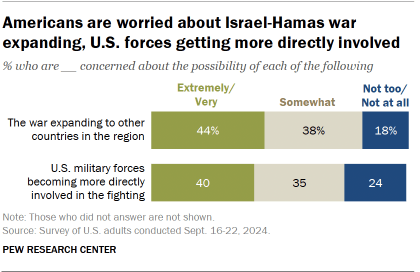
The September survey was in the field during several developments in the conflict. Pagers and walkie-talkies belonging to Hezbollah were detonated in attacks widely attributed to the Israeli government. Israel also assassinated senior Hezbollah commanders, and rocket and artillery fire was exchanged across the Israel-Lebanon border. But the survey concluded prior to Israel’s assassination of Hezbollah leader, Hassan Nasrallah, and before Israel began its recent ground operation in Lebanon and Iran’s ballistic missile attack against Israel.
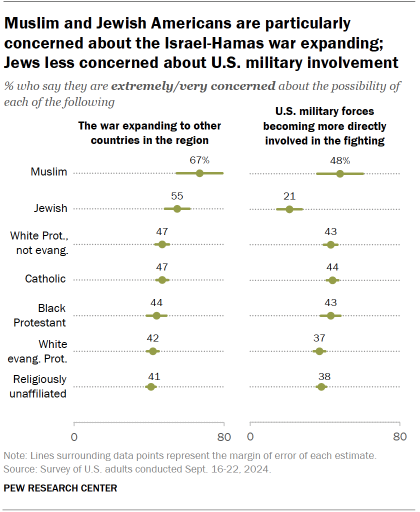
Still, at the time of the survey, concerns about the Israel-Hamas war expanding to other countries were largely unchanged since the question was previously asked in December 2023.(We have not previously asked the question about U.S. military involvement.)
When it comes to the war expanding, there are slight differences by age and party, with older Americans and Democrats being modestly more concerned than younger Americans and Republicans, respectively. On the issue of U.S. involvement, people of all ages and in both parties are equally concerned.
There are also modest differences between religious groups:
- Concern about the war expanding to other countries in the region is especially high among Muslims (67%) and Jews (55%) in the U.S.
- Jewish Americans (21%) are less concerned than other groups about U.S. military forces becoming more directly involved in the fighting. For their part, 48% of Muslim Americans are concerned about this.
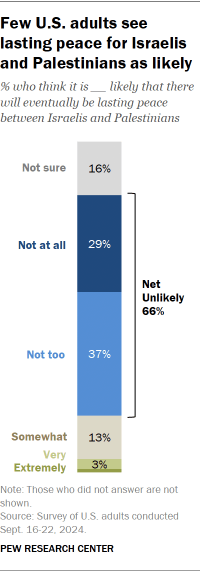
Perceptions of whether lasting peace is likely between Israelis and Palestinians
Relatively few Americans (4%) think it is extremely or very likely that there will eventually be lasting peace between Israelis and Palestinians. An additional 13% say lasting peace is somewhat likely. About two-thirds say it is either not too (37%) or not at all (29%) likely, and 16% are unsure.
The public’s views on this question are little changed since we previously asked it in February 2024. However, there have been shifts among some groups of Americans:
- 69% of Muslims now say lasting peace is unlikely, up from 53% in February.
- 7% of 18- to 29-year-olds say eventual peace is likely, up from 2% in February.
Note: Here are the questions used for this analysis, along with the topline and the survey methodology.

